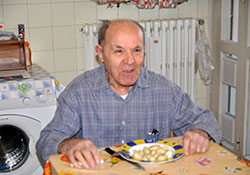Community solidarity in Udine, Italy

WHO/Malin Bring
With one quarter of the population above the age of 65, the Italian city of Udine relies heavily on the work of volunteers when it comes to caring for its older citizens. Most of the volunteers are themselves retired and their number is slowly receding, but the city's mayor is confident that the system is sustainable. "Solidarity is deeply ingrained in our citizens," he says.
A plastic bag full of edibles held firmly in one hand, 63-year old Claudia Degano rings the doorbell of a ground floor flat in a residential area northwest of the city centre. The food is distributed to homebound elderly citizens, who are unable to cook for themselves.
The present stop is one of the last ones on Claudia Degano's delivery route, which today contains 14 addresses. On the busiest days she delivers "meals on wheels" to 20 homes, which takes her all morning. "I like to stay and talk for a while with the users who are lonely and appreciate a chat," she says.
The front door opens and a short, pale man dressed in a comfortably loose shirt bids her welcome. Luigi Delfrate is 90 years old and has been a widower for the past 40 years.
For him, the arrival of his meal is the highlight of the day. "The food is tasty, the portions are big enough, so how could I complain?" he says, seated at his small kitchen table with the unpacked meal in front of him.
Today, the menu is roasted veal, green beans, gnocchi, bread and fruit, and Luigi Delfrate is not hesitant to dig in. Having made sure everything is alright with him, Claudia Degano sets off again. On the way to her car she explains that she has been doing volunteer work for 16 years, and has no plans to give it up. She is paid a small amount for her services by the volunteer association she belongs to, but even if the money is welcome, it is not what motivates her. "Some of the elderly people I visit are very depressed and I'm almost the only one they talk to. I like helping people, and besides, it's good exercise for me to run up and down all those staircases," she says.
Sustainability of volunteer system
In his office in the imposing city hall of Udine, the city's mayor, Furio Honsell, points out that voluntary work is especially needed in times of economic restraint. "At the moment the recession is so bad that it is almost impossible for the municipality to hire people. Even maintaining the services we do have for the elderly is extremely difficult," he says.
There are more than a thousand volunteers in Udine, organized in different associations. The majority of them are retired women, tirelessly delivering meals on wheels, making small repairs around the house, accompanying someone to the doctor or dentist, and arranging social and physical activities for their more needy contemporaries. "Voluntary work is deeply ingrained in our way of life here in the Friuli region. For instance we are one of the areas in the world with the highest percentage of young people who donate blood, so I'm quite confident that our system is sustainable," says Furio Honsell.
"Of course the more the population ages, the fewer individuals there are to provide support for others. The problem will have to be addressed at some stage, but for the time being I don't view it as a serious issue."
Coordinated social care tailored to individual needs
One of the larger volunteer services in Udine is the helpline "No alla solit'Udine" ("No to loneliness"), which is open to needy older citizens for four hours every morning. Three telephone operators are employed by the municipality to answer their calls, and decide what kind of help they need. A cadre of around 1 000 volunteers from 30 organizations offer a variety of services, from delivery of groceries to counselling, taking someone to the hairdresser or reading a book aloud.
"There are no standard services, each case is evaluated individually, and if we assess that our volunteers cannot deal with the problem we forward the case to a doctor or social worker," says Germana Morandini, one of the operators of the helpline. The service is only offered to older persons who lack economic means, and have no family or network to help them out. Germana Morandini finds that the workload has increased in recent years; in 2010, no less than 4 406 services were carried out by the volunteers. "Sometimes we just need to listen to them when they call us, though. Loneliness is a big problem in Udine," she says.
70-year Carla Franzil volunteers for the association "Il Salotto d'Argento" ("The Silver Sittingroom"), which organizes a range of activities for self-sufficient older people. Ever since her mother died some years ago, she has busied herself with voluntary work. "It keeps me very busy - I'm never home these days," she says.
She is, however, more worried about the future than her mayor. "It's a big question, who will take over after our generation," she says with a sigh."Things have changed a lot and the young people are much more materialistic nowadays than we were at their age. My own family is very much taken up by their own matters, and I'm worried that they won't have time to look after me when the time comes. It's something we often talk about in the association."
Behind his ornamented writing desk at the city hall, Furio Honsell nonetheless remains unperturbed about the future of the voluntary system. "Even though we are in the middle of an economic crisis, I don't see the sense of togetherness decreasing. The concept of solidarity is still extremely strong in Udine," he says.



